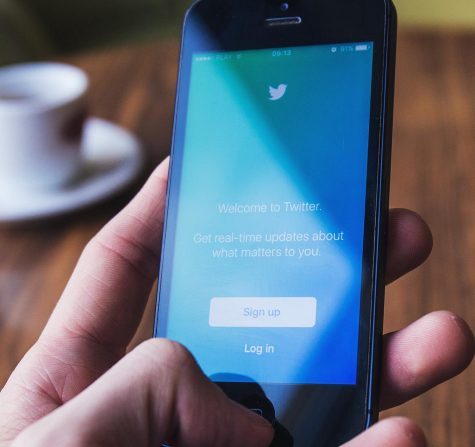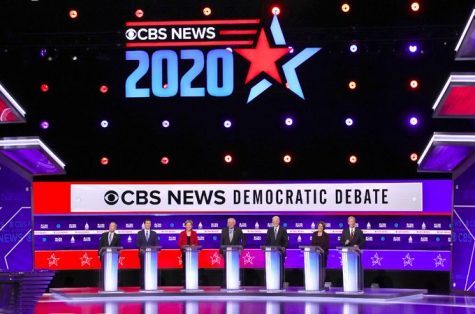Privacy Risks are Worth the Price of Safety
Facial recognition technology in schools promotes safety but may pose additional risks to student privacy. (Courtesy of Twitter)
February 19, 2020
With technology’s influence on our everyday lives becoming increasingly apparent, its capabilities continue to evolve as well. The topic of school safety has become an even higher priority after multiple school massacres such as those at Columbine High School in Colorado in 1999 and at Marjory Stoneman Douglas in Florida in 2018. Extensive precautionary measures have been taken to ensure that the student’s safety is of the utmost importance. While technology has come under scrutiny at times, it is now being used to complete a task that all of the country can unanimously agree on: ensuring the safety of America’s youth.
In the Lockport, New York school district, facial recognition is being implemented to monitor who enters school property. Such a decision is pivotal in maintaining safety in America’s schools. Concerning facial recognition, we as a nation move one step closer to effectively address what it means to maintain a safe school environment. However, some people argue that such a means of ensuring school safety does nothing to address the overarching problem of violence in schools. Instead it perpetuates invasive encroachment on the liberties of students. Among those who argue this is Stefanie Coyle, deputy director of the Education Policy Center for the New York Civil Liberties Union. She stated, “Subjecting 5-year-olds to this technology will not make anyone safer, and we can’t allow invasive surveillance to become the norm in our public spaces.”
Indeed, student’s freedom should be ultimately respected. America cannot afford to gamble with the lives of innocent students because some individuals believe facial recognition technology is an infringement on their privacy. Objections like Coyle’s are reminiscent of the question of surveillance in America like the polarizing Edward Snowden questioning and national exposure of the National Security Agency’s surveillance methods on the lives of the American public, foreign allies and adversaries. This created a firestorm where battle lines were drawn between support for Snowden’s whistleblowing and resentment of these actions, as he was viewed by some people as a traitor to the nation. With such deep-rooted divisions, America cannot lose focus regarding its fundamental promise to its citizens: maintaining the safety of all. Political division is not in our national interest, but the safety of future generations is.
Students should not feel as if their freedoms are being violated. Surveillance in schools should be a part of ensuring safety. Doing so is tantamount to not only the success of students and of the school system, but is indicative of the upholding of the nation to keep students safe as they strive to be educated. Arguing for the use of surveillance in schools, Robert LiPuma, the Lockport City School District’s director of technology, referred to the Parkland shooting, saying “You had an expelled student that would have been put into the system, because they were not supposed to be on school grounds. They snuck in through an open door. The minute they snuck in, the system would have identified that person.” Such a statement indeed begs the question of how many lives could have been saved from school shootings around the country.
Perhaps if schools like Columbine and Stoneman Douglas had such technology available, the horrors that were the gun violence attacks they endured perhaps never would have occurred and lives would have been saved.
Clearly this approach is effective as Stephen Abbot, chief of the Lockport Police Department, says “If a human monitor confirmed a gun that Aegis had detected, an alert would automatically go to both administrators and the Police Department.” Not only can the facial recognition technology filter select who has access to enter school property, but it detects what has indelibly risked the safety of American students: guns. Those complaining that their freedoms are being restricted as a result of the implementation of such technology should not see the incorporation of facial recognition as an obstruction, but rather as something executed in their favor. After all, facial recognition is used on a daily basis, including every time students use social media apps, access their laptops and even use their cellphones. Yet, no complaints are made in this respect even though it’s the same concept.
However, facial recognition in schools is not used to feebly entertain students, but to execute something far more profound: save their lives. To those who object to the measures of Lockport, I pose these questions: was it a violation of your privacy when you spent hours lethargically accessing your iPhone? Is your freedom only violated when you fail to realize that school safety in America is a larger issue than your own desires for a freedom you would lose should you fall victim to school violence? If no action is taken to defend the lives of America’s youth in schools, freedom and lives will be in jeopardy in the wake of school violence.
In a nation where political divides are beginning to take precedence over national interest, and battles for gun laws are being arduously waged, Lockport provides hope to all those advocating for safer school environments. Perhaps, this will even serve as the precursor to legislation tantamount to stricter gun laws to prevent future violence like the shootings America has had to witness. However, one thing must always be clear: there is no price too high to pay to ensure the safety of students in America. Without safety, there is no freedom.
Noah Osborne, FCRH ’23, is a journalism major from Harlem, N.Y.










Excellent article! Thank you for understanding the real reasons why this system has been developed and implemented; to protect the children. Ms. Coyle is ill informed and continues to write articles containing inaccuracies misleading the public. She has been invited to see the system yet has not responded. There have been cameras in schools for decades and now she chooses to speak out?
As you stated, ” If no action is taken to defend the lives of America’s youth in schools, freedom and lives will be in jeopardy in the wake of school violence.” The people opposing this are putting children’s lives at risk.